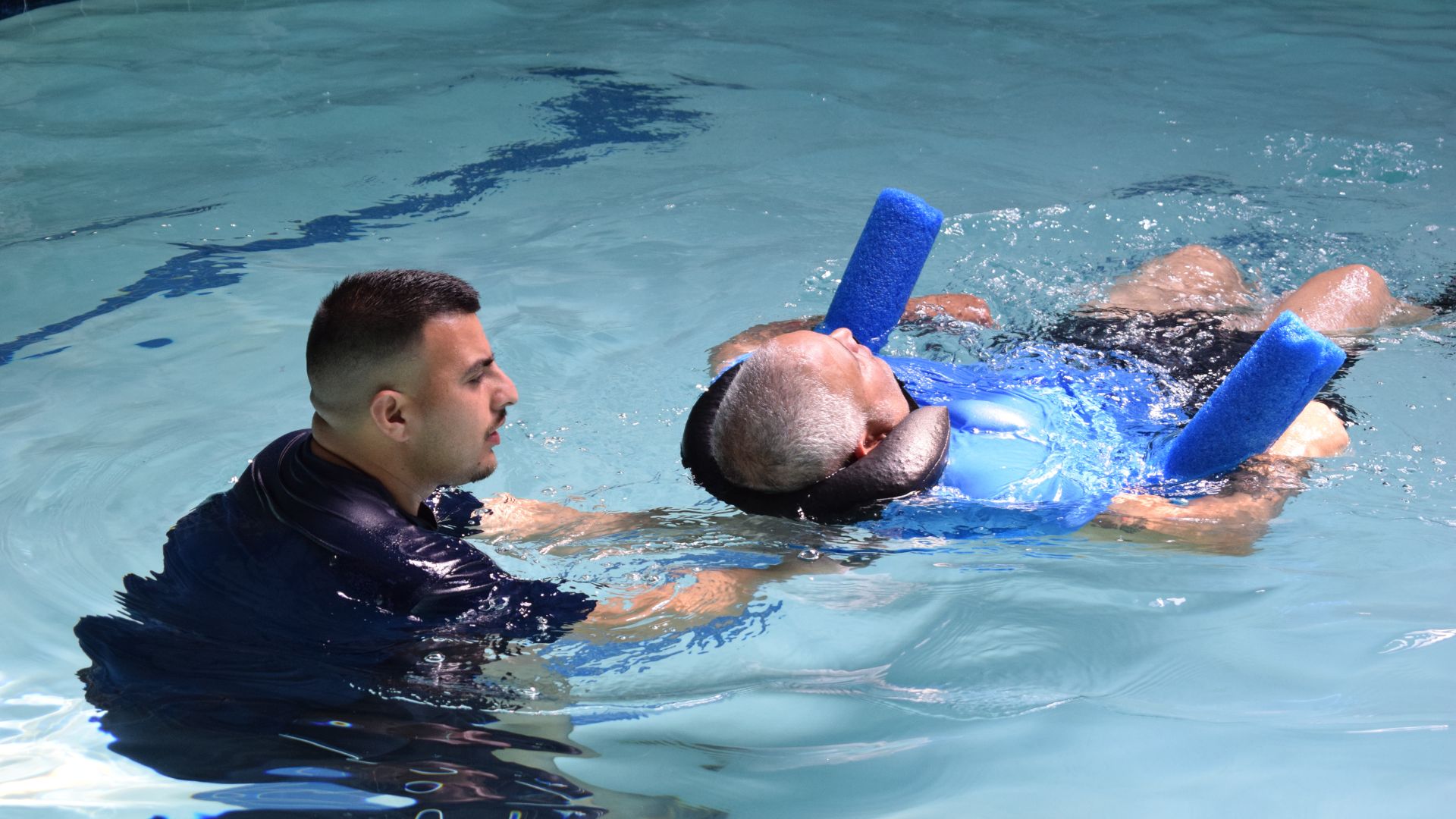Healing aquatic therapy by Kernes Adaptive Aquatics and CSUMB

CSUMB alumni Armando Medina (left) with a client at Kernes Adaptive Aquatics
April 3, 2023
By Mark C. Anderson
A magical oasis sits hidden away in a North Monterey neighborhood, tucked between family homes, waiting to heal clients in need.
At the local nonprofit Josephine Kernes Memorial Pool, Kernes Adaptive Aquatics works much of that magic, providing warm-water therapy for many individuals with physical and/or cognitive challenges, from 3 months to 103 years old.
By partnering with CSUMB's Service Learning program, it also gives dozens of Otter students and alumni real-world experience in providing a vital service, creating cascading benefits for all going forward.
This year, Kernes celebrates 50 years of life-affirming work. Kernes Executive Director Lynn Young describes a symbiosis with the university.
"CSUMB provides fundamental and essential knowledge to students about their fields of study, [and] Kernes Pool provides instruction and hands-on training in aquatic therapy and rehabilitation, where they can work with people of all ages and abilities," Young says. "Formal education combined with practical training prepares graduates for the workplace, and is beneficial in helping them choose among diverse healthcare professions."
CSUMB alumnus Armando Medina worked there for nearly five years.
On campus, he was drawn to kinesiology after a long love affair with sports — he cites a childhood overflowing with swimming, soccer, basketball, and football — and a desire to help those with less mobility and opportunity.
To fulfill his service learning requirement, he spent significant time working with clients in the comforting 92-degree water at Kernes. He found it so rewarding that he continued to work there after graduating.
Along the way, like all Kernes instructors, he earned lifeguard, first aid, CPR, Arthritis Foundation, and Aquatic Therapy and Rehab Institute certifications.
Many of his clients — people who might be recovering from traumatic accidents or coping with chronic illness — also felt drawn to come back.
"They make progress every week and often continue until they're restored," Medina says. "But a lot keep going once they've recovered because the therapy makes them feel great."
Seeing that transformation, he said, proved the most rewarding part of his work.
"Ninety-nine percent of the time they'd show up in pain, or unhappy, or tired, or whatever it was," Medina says. "By the time they'd finish a session, they'll leave with smiles on their faces — more energetic, more relaxed, more happy."
Medina has gone on to lead the recreation department for the city of Hollister, servicing thousands of residents.
Fellow Otter alum Ramon Martinez Ochoa, another CSUMB kinesiology graduate, says he continues to work at Kernes for similar reasons.
Service learning classmates recommended Kernes to Martinez Ochoa for real-life applications to help him pursue a doctorate in physical therapy.
"I immediately wanted to get hands-on experience," he says. "What a great way to build social skills and simple techniques, working toward my dream."
Part of Martinez Ochoa's job is to help manage the pool's administrative demands and perform initial assessments. He said he finds the greatest meaning in the transformations he sees in clients.
"Some of our clients aren't able to walk post-stroke, or because they're quadriplegic, so on land they're set in a wheelchair or laying in bed," he says. "But once we get them in the water, we're able to get them up standing and floating free. Being able to relieve the stress they feel, and see the looks on their faces, is very fulfilling."
Sara Powell, a CSUMB assistant professor of kinesiology, helps connect students to the aquatic therapy opportunity.
She sees "a neat full-circle moment" for alumni like Medina and Martinez Ochoa. The program allows for both active learning as kinesiology students and further evolution as post-grad employees.
She also says it exemplifies the CSUMB vision statement to create curriculum that is "student- and society-centered and of sufficient breadth and depth to meet statewide and regional needs, specifically those involving both inner-city and isolated rural populations, and needs relevant to communities in the immediate tri-county region," meaning Monterey, San Benito, and Santa Cruz counties.
"This is an avenue for faculty and students to use for collaborative research," Powell says, "examining the effects of aquatic therapy among special populations."
"We hope to continue to strengthen this partnership and expand opportunities for our students while meeting the needs of Kernes," she adds.
In other words, these warm-water Otters are helping everyone they can — themselves included — to keep swimming.
Learn more on the Kinesiology Department webpage.